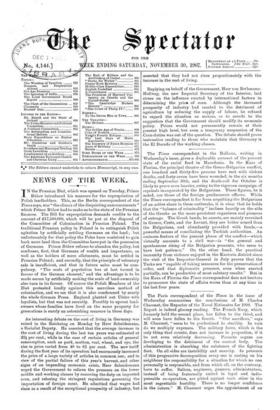The Times correspondent in the Balkans, writing in Wednesday's issue,
gives a deplorable account of the present state of the racial feud in Macedonia. In the Kaza of Florina, the principal theatre of the Greco-Bulgarian conflict, one hundred and thirty-five persons have met with violent deaths, and forty-seven have been wounded, in the six months ending September 30th, and the death-roll for October is likely to prove even heavier, owing to the vigorous campaign of reprisals inaugurated by the Bulgarians. These figures, be it noted, are those of the foreign gendarmerie officers. While the Times correspondent is far from acquitting the Bulgarians of an active share in these outbreaks, it is clear that he holds that the " balance of criminality " inclines heaVily on the side of the Greeks as the more persistent organisers and pioneers of outrage. The Greek bands, he asserts, are mainly recruited in Greece, Crete, and the Levant, they are better armed than the Bulgarians, and abundantly provided with funds,—a powerful means of conciliating the Turkish authorities. An ominous feature of the present phase of the conflict—which virtually amounts to a civil war—is " the general and spontaneous rising of the Bulgarian peasants, who seem to have lost patience." On the other band, the practical immunity from violence enjoyed in the Kastoria district since the visit of the Inspector-General in July proves that the Turks are " capable of taking measures for the preservation of order, and that diplomatic pressure, even when exerted partially, can be productive of most salutary results." But in the Kaza of Florina, the Times correspondent does not hesitate to pronounce the state of affairs worse than at any time in the last four years.


















































